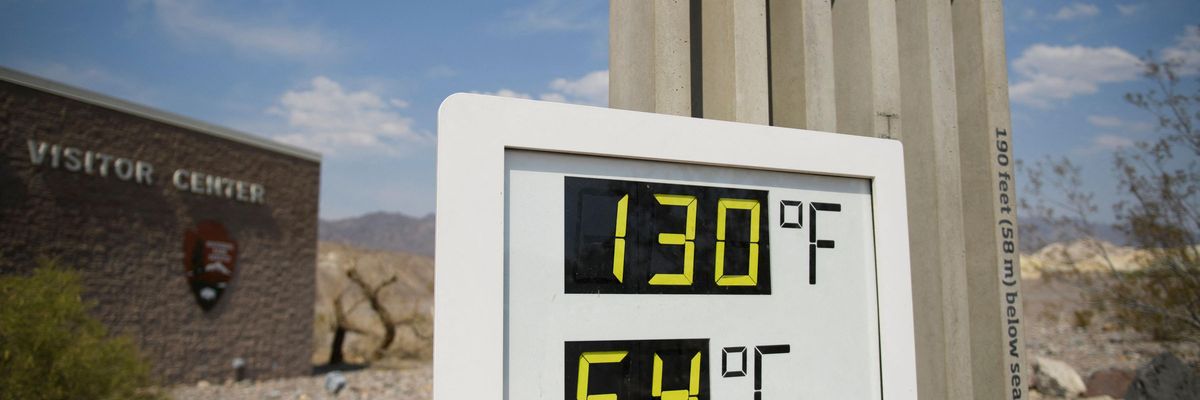

SUBSCRIBE TO OUR FREE NEWSLETTER
Daily news & progressive opinion—funded by the people, not the corporations—delivered straight to your inbox.
5
#000000
#FFFFFF
To donate by check, phone, or other method, see our More Ways to Give page.


Daily news & progressive opinion—funded by the people, not the corporations—delivered straight to your inbox.

A thermometer shows a temperature of 130deg Fahrenheit (54deg Celsius) at the Furnace Creek Visitor's Center at Death Valley National Park in California on June 17, 2021. (Photo: Patrick T. Fallon/AFP via Getty Images)
Last year saw record-breaking high temperatures recorded at more than 400 weather stations around the world, with meteorologists voicing alarm over what climate scientists say is the shape of things to come, according to a report published Friday.
The Guardian reports that 10 countries--Canada, Dominica, Italy, Morocco, Oman, Taiwan, Tunisia, Turkey, the United Arab Emirates, and the United States--set or matched their national monthly high temperature records last year.
" Climate change is real and it's now," tweeted Catherine McKenna, founder of Climate and Nature Solutions and a former Canadian environment and climate change minister.
McKenna noted the numerous Canadian temperature records that were shattered last year, including in Lytton, British Columbia, where the mercury soared to 49.6degC, or 121.3degF, in late June.
According to The Guardian:
A few continental and planetary records fell too: Africa had its warmest June and September ever. August brought 48.8degC (119.8degF) in Syracuse, Italy, the highest temperature ever recorded in Europe. July had already brought 54.4degC (130degF) in Furnace Creek in the U.S. Death Valley--the highest reliably recorded temperature on Earth.
"You can certainly see the effect of climate change in our weather in Kenya, and globally," Patricia Nying'uro of the Kenyan Meteorological Department and co-founder of Climate Without Borders--an international group of broadcast meteorologists and weather presenters--told the paper.
"We're just putting together the data for 2021, but we think we will have seen an annual temperature which is 2.1degC higher than normal for some parts of the country," she added. "The shifts are very noticeable, from one extreme to another in a very short space of time."
Meteorologists around the world said the event that made the biggest impression on them last year was the heatwave that hit western North America in June and July, killing hundreds of people in Canada and the United States and setting records from Alaska and the Yukon Territory to California.
Related Content

"Of course 2021 was full of extreme events," Maximiliano Herrera, who tracks extreme weather around the world, told The Guardian. "But if I have to name one, I'll name what struck every single climatologist and meteorologist in the world... the mother of all heatwaves."
"The magnitude of this event surpassed anything I have seen after a life of researching extreme events in all modern world climatic history in the past couple of centuries," he said.
Climate scientists say such record-breaking heatwaves are likely to become increasingly frequent in the coming decades.
"We must expect extreme event records to be broken," Rowan Sutton of the National Center for Atmospheric Science at the University of Reading in England warned last July, "not just by small margins but quite often by very large ones."
Dear Common Dreams reader, The U.S. is on a fast track to authoritarianism like nothing I've ever seen. Meanwhile, corporate news outlets are utterly capitulating to Trump, twisting their coverage to avoid drawing his ire while lining up to stuff cash in his pockets. That's why I believe that Common Dreams is doing the best and most consequential reporting that we've ever done. Our small but mighty team is a progressive reporting powerhouse, covering the news every day that the corporate media never will. Our mission has always been simple: To inform. To inspire. And to ignite change for the common good. Now here's the key piece that I want all our readers to understand: None of this would be possible without your financial support. That's not just some fundraising cliche. It's the absolute and literal truth. We don't accept corporate advertising and never will. We don't have a paywall because we don't think people should be blocked from critical news based on their ability to pay. Everything we do is funded by the donations of readers like you. Will you donate now to help power the nonprofit, independent reporting of Common Dreams? Thank you for being a vital member of our community. Together, we can keep independent journalism alive when it’s needed most. - Craig Brown, Co-founder |
Last year saw record-breaking high temperatures recorded at more than 400 weather stations around the world, with meteorologists voicing alarm over what climate scientists say is the shape of things to come, according to a report published Friday.
The Guardian reports that 10 countries--Canada, Dominica, Italy, Morocco, Oman, Taiwan, Tunisia, Turkey, the United Arab Emirates, and the United States--set or matched their national monthly high temperature records last year.
" Climate change is real and it's now," tweeted Catherine McKenna, founder of Climate and Nature Solutions and a former Canadian environment and climate change minister.
McKenna noted the numerous Canadian temperature records that were shattered last year, including in Lytton, British Columbia, where the mercury soared to 49.6degC, or 121.3degF, in late June.
According to The Guardian:
A few continental and planetary records fell too: Africa had its warmest June and September ever. August brought 48.8degC (119.8degF) in Syracuse, Italy, the highest temperature ever recorded in Europe. July had already brought 54.4degC (130degF) in Furnace Creek in the U.S. Death Valley--the highest reliably recorded temperature on Earth.
"You can certainly see the effect of climate change in our weather in Kenya, and globally," Patricia Nying'uro of the Kenyan Meteorological Department and co-founder of Climate Without Borders--an international group of broadcast meteorologists and weather presenters--told the paper.
"We're just putting together the data for 2021, but we think we will have seen an annual temperature which is 2.1degC higher than normal for some parts of the country," she added. "The shifts are very noticeable, from one extreme to another in a very short space of time."
Meteorologists around the world said the event that made the biggest impression on them last year was the heatwave that hit western North America in June and July, killing hundreds of people in Canada and the United States and setting records from Alaska and the Yukon Territory to California.
Related Content

"Of course 2021 was full of extreme events," Maximiliano Herrera, who tracks extreme weather around the world, told The Guardian. "But if I have to name one, I'll name what struck every single climatologist and meteorologist in the world... the mother of all heatwaves."
"The magnitude of this event surpassed anything I have seen after a life of researching extreme events in all modern world climatic history in the past couple of centuries," he said.
Climate scientists say such record-breaking heatwaves are likely to become increasingly frequent in the coming decades.
"We must expect extreme event records to be broken," Rowan Sutton of the National Center for Atmospheric Science at the University of Reading in England warned last July, "not just by small margins but quite often by very large ones."
Last year saw record-breaking high temperatures recorded at more than 400 weather stations around the world, with meteorologists voicing alarm over what climate scientists say is the shape of things to come, according to a report published Friday.
The Guardian reports that 10 countries--Canada, Dominica, Italy, Morocco, Oman, Taiwan, Tunisia, Turkey, the United Arab Emirates, and the United States--set or matched their national monthly high temperature records last year.
" Climate change is real and it's now," tweeted Catherine McKenna, founder of Climate and Nature Solutions and a former Canadian environment and climate change minister.
McKenna noted the numerous Canadian temperature records that were shattered last year, including in Lytton, British Columbia, where the mercury soared to 49.6degC, or 121.3degF, in late June.
According to The Guardian:
A few continental and planetary records fell too: Africa had its warmest June and September ever. August brought 48.8degC (119.8degF) in Syracuse, Italy, the highest temperature ever recorded in Europe. July had already brought 54.4degC (130degF) in Furnace Creek in the U.S. Death Valley--the highest reliably recorded temperature on Earth.
"You can certainly see the effect of climate change in our weather in Kenya, and globally," Patricia Nying'uro of the Kenyan Meteorological Department and co-founder of Climate Without Borders--an international group of broadcast meteorologists and weather presenters--told the paper.
"We're just putting together the data for 2021, but we think we will have seen an annual temperature which is 2.1degC higher than normal for some parts of the country," she added. "The shifts are very noticeable, from one extreme to another in a very short space of time."
Meteorologists around the world said the event that made the biggest impression on them last year was the heatwave that hit western North America in June and July, killing hundreds of people in Canada and the United States and setting records from Alaska and the Yukon Territory to California.
Related Content

"Of course 2021 was full of extreme events," Maximiliano Herrera, who tracks extreme weather around the world, told The Guardian. "But if I have to name one, I'll name what struck every single climatologist and meteorologist in the world... the mother of all heatwaves."
"The magnitude of this event surpassed anything I have seen after a life of researching extreme events in all modern world climatic history in the past couple of centuries," he said.
Climate scientists say such record-breaking heatwaves are likely to become increasingly frequent in the coming decades.
"We must expect extreme event records to be broken," Rowan Sutton of the National Center for Atmospheric Science at the University of Reading in England warned last July, "not just by small margins but quite often by very large ones."